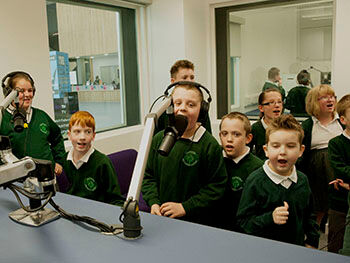University News Last updated 30 March 2015

Children with autism learned valuable communication skills when they recorded a podcast with media students in state-of-the-art broadcast facilities at the University.
The pupils, aged between five and 11, from Hazel Oak School, Shirley, visited state-of-the-art studios at our City Centre Campus to create a news report. Younger pupils performed stories and riddles on the theme of ‘Under the Sea’.
Use of multimedia improves communication skills in children with special education needs, according to the head of Hazel Oak lower school Andrew Simms. He said: “Broadcast is an ideal format for autistic children, in that it demonstrates to them how people change their voice when speaking and taps into more general skills for verbal communication.
“We are keen at all times to encourage a sense of how children can affect and influence their environment, rather than how the environment affects them.
“The children have been engaging in a Challenge Week and their visit to Birmingham City University helped them achieve the end goal of a podcast.
“The kids recorded riddles, stories and sound effects on a sea theme.
“Use of multimedia brings out their speaking and listening skills – the children like to see what they look and sound like and over the past three years we’ve piloted using iPads in the classroom. Technology opens up so many doors for children with autism, and allows for greater independence and confidence."
Huma Mian, a third-year media and communications student at Birmingham City University, edited recordings on the day. He said: “In terms of my studies I didn’t expect to be doing something like this, but it was really rewarding. Kids who were pretty quiet at the start of the day got really excited when it was their turn to record.
“It was nice for each of them to have their moment in the studio and to involve everyone else, playing instruments and expressing themselves creatively. What’s more, the podcast gives them a permanent record of their day with us. It’s something they can listen to again, to see what they achieved.”